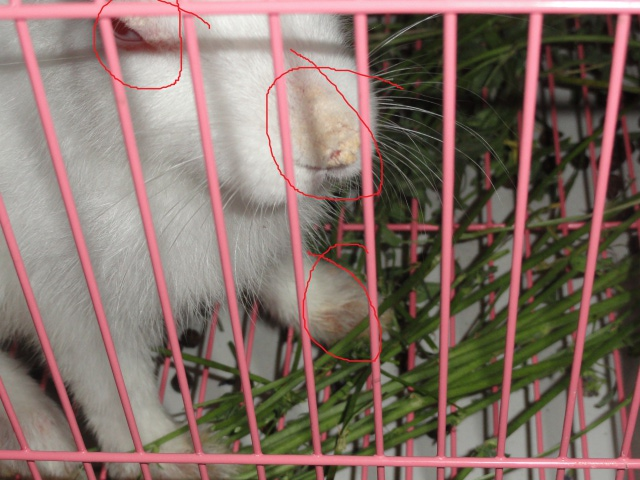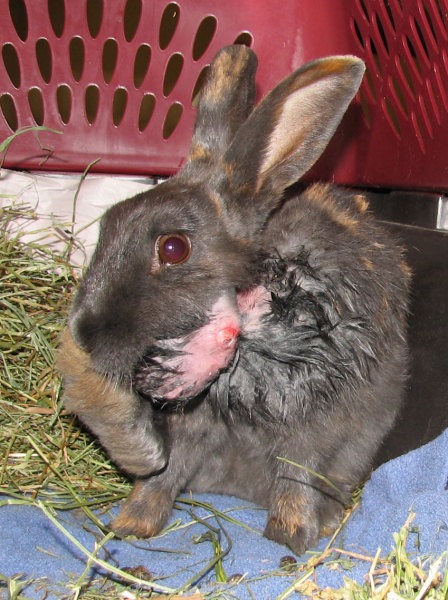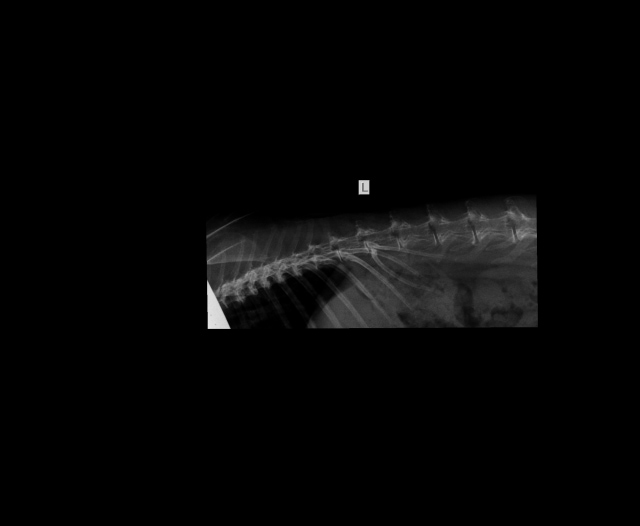QuestionQUESTION: Two weeks ago my rabbit had fluid in his lungs. My vet thought pneumonia and he was put on Baytril and aspirin. No improvement 2 weeks later. He had 2 x-rays and the latest one showed more fluid. She aspirated fluid today and is sending for results. He is eating, drinking, pooping, etc., normally except his breathing is labored. Any suggestions? I'm extremely worried. Your help would mean a great deal. Thank you.
ANSWER: Hi Adelaide,
Oh boy....lower respirtory infections in rabbits are very difficult to treat. I have treated quite a few successfully but it takes a vet that will work "outside the box" and will require a lot of work on your part. Several things can cause fluid buildup in the lungs and/or chest area. The most common is a bacterial infection. I treat lots of cases of "aspiration pneumonia" which always turns into bacterial pneumonia in my wildlife rescue. We find fluid in the lungs when animals are exposed to a very heavy rain or they are fed by well meaning but untrained people. It is always a challenge.
A couple of possible causes come to mind immediately in house rabbits. First is a bacterial infection. The most common pathogen causing these infections is Pasteurella Multocida. It is a common bacteria in rabbits. Staph A and Pseudomonas (this is particularly difficult to deal with) are just a couple of other possibilities. I am assuming your vet is culturing the fluid she aspirated from the lungs...this is proper diagnosis. If a bacterial infection is confirmed, the sensitivity should show what drugs would be appropriate. I would base my treatment on that lab. I am not a fan of Baytril. It has long been considered a safe and effective drug. But....it has been so overused that some of the tough bacteria we see in rabbits has or is becoming resistant. The drug isn't working too well these days. Most of the vets I know have all but abandoned Baytril. The drugs I normally use based upon the labs include penicillin (a very specific version of penicillin), zithromax, doxycycline or chloramphenicol. I have recently started using a newly approved drug (for dogs and cats) called Convenia. Many consider penicillin unsafe for use in rabbits. Administered improperly, it is fatal but if used properly it is very safe and effective. It treats a wide range of bacteria. WARNING:IF THIS DRUG IS ADMINISTERED BY MOUTH IT WILL RESULT IN DEATH. I use Zithromax in a lot of cases. The key to using this drug is that it is administered at a much higher dosing level than with dogs or cats. I use a combinatin of Penicillin and Zithromax to treat anaerobic bacteria found in serious infections (abscesses) in rabbits. Chloramphenicol is very safe and effective but has fallen from favor due to some possible adverse reactions with humans that are handling it. Convenia is a cephalosporin and we use that class of drugs to treat penicillin resistant bacteria. It is safe only as an injecrable (and it is used only as a sub-q injection in all species). The web site states it should not be used in rabbits but I have used it in rabbits (domestic and wild) and squirrels. It does appear that a second injection of this drug 7-10 days after initila treatment will be requried when it's used in rabbits.
This condition could be caused by some problem in the renal system. I would suggest a blood panel and ask for a titer for E Cuniculi. This is a protozoan infection that very few vets have actually seen a true case. One of the "markers" of this issue in unexplained kidney issues. This disease is very difficult to treat. Most vets that do attempt to treat it use Fenbendazole (a deworming medication). I have been using a different drug....Marquis. EC spores can severely injured the kidneys which results in fluid retention. A CBC with EC titer will check for EC antibodies as well as show how the kidneys and other vital organs are functioning. That could be important in this diagnosis.
I usually have my rabbits in oxygen with this problem. Neubilization (basically a vaporizer that puts med directly into the lungs) might also help. Most of the time the drug used is Amikacin.
I am concerned about using aspirin in rabbits. I know some people do but I am always concerned with gastric ulcers when using this drug. If moderate pain meds or help with inflammation is needed, there are much safer and more efffective drugs. Metacam is the drug of choice of most vets. But it can have some major negative effects on the liver or kidneys when used long term or with a dehydrated animal. Tramadol is an effective pain med and can be used to slightly sedate which might help with the breathing. It might help remove some fluid by using a diuretic such as lasix.
Now after all of that....here is my overall suggestions. Keep in mind that I am not a vet and your doctor is in the best position to make decisions on treatment
>Get more aggressive with antibiotic treatment based on the results of the lab.
>Use oxygen if necessary....along with a neubilizer if necessary.
>Revisit the use of the aspirin and look for safer and more effective drugs for pain management and/or imflammation.
>Discuss using Lasix to attempt to disperse the fluids.
I would really like to get an update when the results of the lab return. Maybe I can make some more specific comments at that time. Please update me when you have the results of the labs.
---------- FOLLOW-UP ----------
QUESTION: Randy: I wanted to update you as you asked. Tiny last visited the vet on 11/18. She stated the mass had not shrunk in size and even tho there are no cancer cells present in the lung aspiration she did, she believes it is cancer and he will die soon. He is on doxycycline and lasix daily and Metacam if he is in pain. He hops around, eats, drinks, urinates, poops, etc. I find this diagnosis hard to believe. She stated an ultrasound would only tell what type of cancer it was and would not cure anything. His breathing seems better but he has lost a bit more weight. What is your opinion on this? Can she possibly be wrong? Thank you.
AnswerWell....I don't have any problem with the treatment your doctor is using. Doxycycline is an excellent drug for the most common infections seen in LRIs. The lasix should expel some of the fluids. And Metacam is an excellent NSAID...but we don't generally use it long term due to impacts on the liver and kidneys. I don't usually use it longer than 3 days unless we have a very unusual situation and I maintain hydration. It might be a good idea to at least discuss using the Tramadol.
We have "Pistol Pete". I woke up one morning and he was on his side and in obvious pain. It was early and my vet wasn't even at the clinic yet but I called ahead (a little over an hour trip) and gave them a head's up. I knew my vet didn't start until at least 9 so we were looking at several hours of low oxygen so I requested that he be put on oxygen immediately upon arrival. Since they know me so well, it was done. But they also called my vet and she came in early due to his respiratory distress. It looked bleak and we didn't think he would make it. But we followed a treatment much like you are....and it's been a couple of years and he is still with us and very healthy. PP fought hard and so did we. As long as your rabbit is eating, drinking, pooping and doing normal rabbit stuff....keep doing what you are doing. Point is....we never really know but do everything you possibly can for him....good things will happen.
You might want to talk with your vet about an infection of B Comp....it really is a "picker upper". If he is losing weight, increase the calories gradually. When we need to do that, we slowly add higher protein pellets (like show formula that is about 18% protein) and add alfalfa hay to the diet. It is very important to do this very gradually to allow the digestive system to acclimate to a higher protein diet. There is also a feeding formula offered by Oxbow Hay Company called "Critical Care". It is designed as a high octane food for sick herbivores. It can be syringe fed or the powder can be sprinkled on food.
While cancer is always a possibility....I can't say that I have ever seen a confirmed case in the lungs. No doubt it can happen but it would be very rare. Keep up the fight.

 rabbits skin disease
Question
sanjeevs rabbit sanjeevs rabbit
rabbits skin disease
Question
sanjeevs rabbit sanjeevs rabbit
 Baby bunny with injury
Questionbaby rabbit
QUESTION: Hello, my name is
Baby bunny with injury
Questionbaby rabbit
QUESTION: Hello, my name is
 Severe Jaw Abscess
Question
Jaw Abscess Rescue
Hello Dana,
I have read th
Severe Jaw Abscess
Question
Jaw Abscess Rescue
Hello Dana,
I have read th
 Questions about my rabbits behavior
Question
Cadico
Hi i adopted a bunny in august 2
Questions about my rabbits behavior
Question
Cadico
Hi i adopted a bunny in august 2
 E. Cuniculi?
QuestionQUESTION: Hello Dana,
I would appreciate your a
E. Cuniculi?
QuestionQUESTION: Hello Dana,
I would appreciate your a